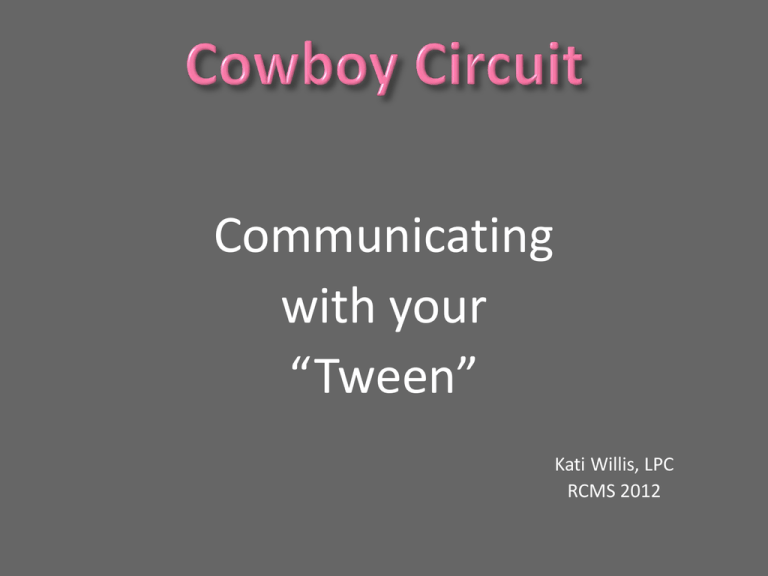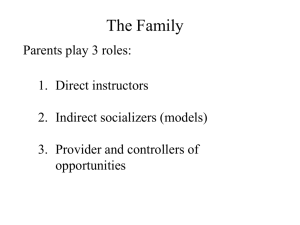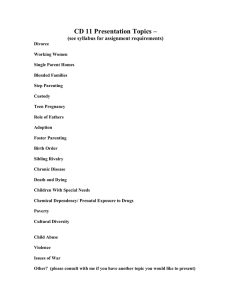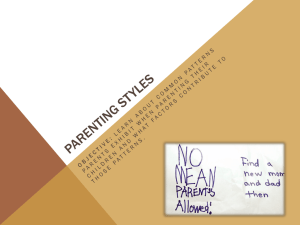
Communicating
with your
“Tween”
Kati Willis, LPC
RCMS 2012
Parenting Style Quiz
Parenting Styles
Child Temperament
Influence on family dynamics
Strategic Listening
How to talk about difficult subjects
- Sex, drugs, alcohol, relationships, suicide
Communication Tips
Conversation Starters
1. If your son hits a child at a sports practice. What
would you do?
a. Get mad at your son's actions, and tell the other
child to hit him back.
b. Ignore the kids and let them handle it.
c. Tell him not to hit other people, make him apologize,
and if this is a second offense, take away one of his
privileges.
Pediatrics.about.com
2. Your son and his friends have made a big mess, and
now they want to go outside. What would you do?
a. Yell at them to clean up.
b. Go ahead and let them go outside, while you clean.
c. Help them clean by making a game out of it.
Pediatrics.about.com
3. You and your pre- teen daughter are renting a few
movies, and she wants to rent an R- rated movie that all of
her friends have seen. What would you do?
a. Get mad, telling her she can't rent the movie.
b. Go ahead and let her watch the movie.
c. Tell her no and help her find a more appropriate movie.
Pediatrics.about.com
4. You daughter is procrastinating her bedtime by saying
that she would like something to eat. What would you do?
a. Make her go to bed hungry because it's her bedtime.
b. Go ahead and let her eat a snack before bed.
c. Give her a healthy snack, but tell her it's the last time she
gets a late- night snack because she'll need to start eating
more at dinner.
Pediatrics.about.com
5. What do you do if you kids don't do their chores?
a. Yell and make them do them right then.
b. Do the chores yourself.
c. Remind them that they need to do their chores.
Pediatrics.about.com
6. What do you do when your child whines and has a
tantrum?
a. Send him to his room.
b. Give in, in hopes to stop him.
c. Wait till he's done with his tantrum and explain to
him there are better ways to express his frustration.
7. If your child gets in trouble, what do you do?
a. Yell or spank the child.
b. Don't do anything.
c. Discipline the child and then explain that there are better
choices to make.
Pediatrics.about.com
8. Your son wants a certain toy that he sees at the grocery
store. What do you do?
a. Tell him that he can't have the toy.
b. Buy it for him to prevent a potential scene.
c. Tell him no, but explain that when he saves up his money,
you'll take him back so that he can purchase the toy himself.
Pediatrics.about.com
9. What do you do if you pre- school aged daughter had
a nightmare and wakes you up?
a. Get mad because she woke you up and tell her to
just go back to bed.
b. Let her sleep wherever she wants, even if that means
in your bed.
c. Comfort her and try to help her back to sleep once
she's calmed down.
Pediatrics.about.com
10. What is the main goal of parenting and discipline?
a. To get your children to listen to adults no matter
what.
b. To make sure that everyone is happy.
c. To teach your children why rules are important and
to help them learn how to make good choices.
Pediatrics.about.com
If you had more 'A' answers, you are more of an
authoritarian parent. Authoritarian parents exert a
high level of control over children’s behaviors.
They stress the importance of obedience in regards
to authority. Most authoritarian parents rely on
punishment to shape behavior. High expectations
to conform. Demanding of their children but not
particularly responsive to their children’s emotional
needs or concerns.
If you had more 'B' answers, you are more of a
permissive parent. Permissive parents are
responsive to the emotional needs of their children
but are not demanding. Tend to set few boundaries
or behavioral expectations for their children. Fewer
rules and more freedom than other styles (no
schedules, few chores, etc.). Most permissive
parents do not have the same behavioral
expectations as the other parenting types.
If you had more 'C' answers, you are more of an
authoritative parent. Authoritative parents believe
that both the parent and children have certain
rights that are of equal importance. They tend to
set clear rules and behavioral expectations for their
children but allow significant freedom and
independence. Most authoritative parents are sure
of their control and don’t need threats of
punishment or physical force to keep their children
on track.
Parenting style is directly related to the emotional
and social development of children.
Parenting styles are a strong influence on the
household dynamics.
Parenting style is directly related to the kind of
relationship parents have with their children.
•Authoritarian
parenting styles generally lead to children who
are obedient and proficient, but they rank lower in happiness,
social competence and self-esteem.
•Authoritative parenting styles tend to result in children who
are happy, capable and successful (Maccoby, 1992).
•Permissive parenting often results in children who rank low in
happiness and self-regulation. These children are more likely to
experience problems with authority and tend to perform poorly
in school.
•Uninvolved parenting styles rank lowest across all life domains.
These children tend to lack self-control, have low self-esteem
and are less competent than their peers.
If two parents have different styles, the kids already
know it. They use it to their advantage.
EX: Dad will say no, I’ll ask mom instead
Important for parents to compromise and be
consistent, present a united front. Issue of balance
and overcompensation. Emotional needs vs.
expectations.
Do we really listen?
flow of information changes
Level of disclosure changes
Fixing is not listening
Confusion, loss, anxiety
Over-control
Buddy boundaries
Disengage
The most effective way to improve communication
is to become a better listener
Types of STRATEGIC listening: 4 levels
Facts
Meaning
Feeling
Intention
©Chris Witt, all rights reserved. www.wittcom.com
People/children want to convey information.
Our task is to listen for details and clarify.
We need to ask "Who? What? Where? When?
Why? How?"
Our goal is to picture the situation as the
person/child is describing it.
©Chris Witt, all rights reserved. www.wittcom.com
People/children want to make themselves understood.
Our task is to listen for the big picture; summarize and
paraphrase.
We need to ask "Am I understanding you correctly?"
"Is this what you're getting at?"
Our goal is to understand what the person/child means
— and make the other person/child feel understood
©Chris Witt, all rights reserved. www.wittcom.com
Level 3 Feelings
People/children want to connect on an emotional
level.
Our task is to listen with empathy; pay attention to
body language and tone of voice.
We need to ask "How do you feel about it?"
"It sounds to me like you're feeling..."
Our goal is to recognize how the person/child is feeling
— and make the other person feel understood and
connected.
©Chris Witt, all rights reserved. www.wittcom.com
People/children want to get their needs met.
Our task is to listen for wants and needs; focus on
solutions, action steps, and outcomes
We need to ask "What do you want to have
happen?"
"What would help you in this situation?"
"What can you/we do about it?"
Our goal is to know what the person/child wants to
achieve.
©Chris Witt, all rights reserved. www.wittcom.com
CDC, 2009 : Youth Risk Behavior Surveillance System
(YRBSS)
The 2009 YRBSS included a national school-based
survey conducted by CDC, 47 state surveys, four
territory surveys, two tribal government surveys,
and 23 local surveys conducted among students in
grades 9–12 during October 2008—February 2010.
Sex
46% of high school students have already had sexual intercourse
(average age = 17)
14% had already had sex with 4 or more partners
50% of 15 to 19 yr. olds (oral sex)
Average age of first sexual experience = 15.8
Drugs
37% had smoked marijuana once or more (lifetime)
21% in the past 30 days
11% had sniffed glue or inhaled aerosol, paint or some form of
chemicals to get high once or more (lifetime)
Alcohol
42% had at least 1 drink on at least 1 day w/in the last 30
days
24% had 5 or more drinks in a row in a few hours time on at
least 1 day (binge drinking)
Suicide
14% seriously considered attempting suicide w/in last 12
mo.
11% made a plan to kill themselves
6.3% attempted suicide once or more
Now is the time to start communicating about
these topics. Do not wait until they approach you –
your silence tells them YOU are not ready to discuss
these topics. They’re waiting…..
Do not wait until they get in trouble
Talk to them in a matter-of-fact manner
Do not get emotional
Maintain good boundaries (do not overshare)
Allow someone else you trust to talk to them about
these issues if you are not comfortable
Do not underestimate their exposure to
inappropriate materials
Do not underestimate their level of “maturity”
Assume they know more than you think they do
Tell me what you know, talk to me about how you feel
about….sex, drugs, etc…
In the next couple of months/years, you’re going to face
some situations without me….how will you handle it
if…when….what will you say?
You know how I feel about drinking. No matter how
angry you think I might be, I need you to call me if
you’re ever in a car with someone who is drinking. I
PROMISE not to lecture or punish you about it that
night.
I need for you to know that no matter what decisions
you make, whether I agree or not…I will love and
support you.
Depression: sleep, eating, motivation, school
Suicidal ideations, preoccupation with death
Self-injury
Attempts to communicate typically result in arguing
Disconnect/Shut out
Drug use (suspicions)
Delinquency
Runaway
Sexual behavioral problems
Baumguard , 1967, 1971, 1973, 1978
McCobey & Martin, 1983
Rhee, 2006
Hill & Tyson, 2009
Witt – 2011
CDC – YRBSS, 2009
Ybarra & Mitchell, 2005




